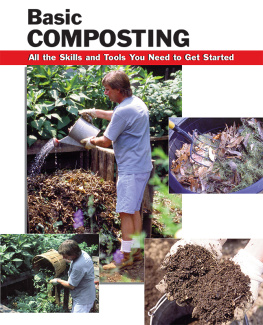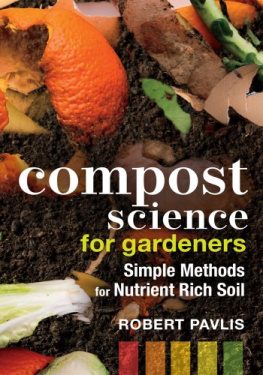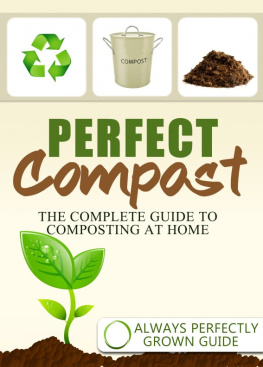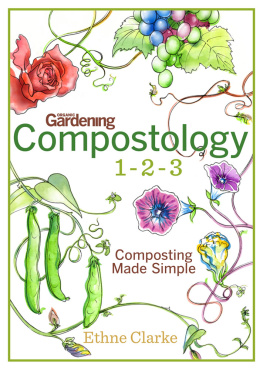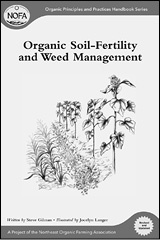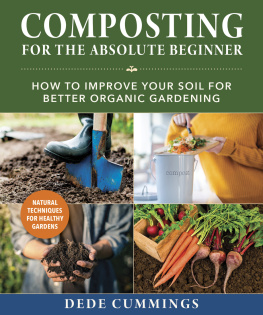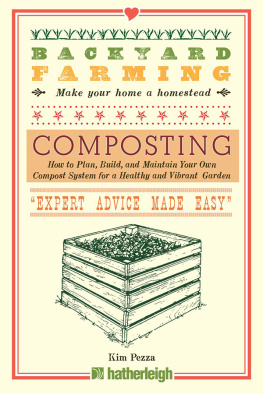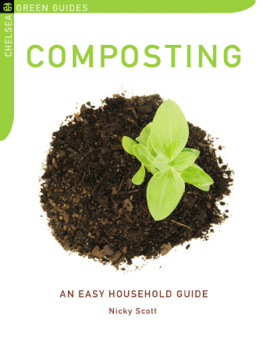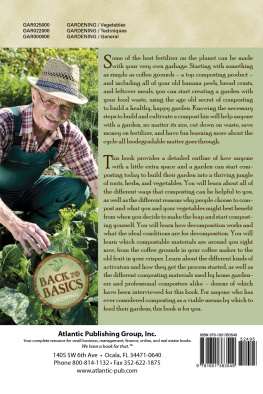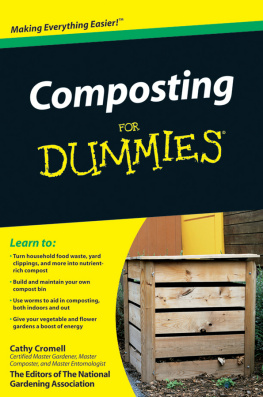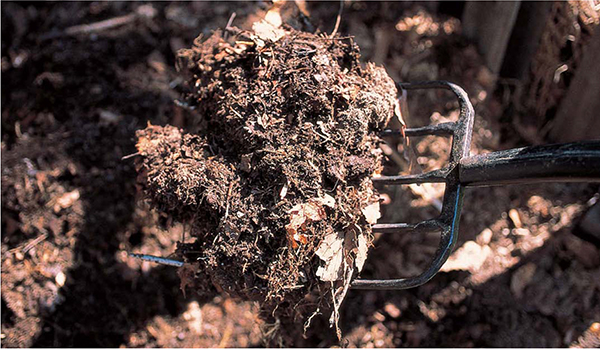Resources
BOOKS ABOUT COMPOSTING
The following titles contain information and ideas useful to beginners looking to advance their skills or learn more technical aspects of composting.
Alexander, Ron. Field Guide to Compost Use. Harrisburg, PA. U.S. Composting Council, 1996.
Appelhof, Mary. Worms Eat My Garbage. Kalamazoo, MI: Flower Press, 1982.
Compost: Rodale Organic Gardening Basics Volume 8. Editors of Rodale Organic Gardening Magazine and Books. Emmaus, PA: Rodale Inc., 2001.
Roulac, John W. Backyard Composting: Your Complete Guide to Recycling Yard Clippings. Sebastopol, CA: Harmonious Technologies, 1997.
Stell, Elizabeth P. Secrets of Great Soil. Pownal, VT: Storey Communications, 1998.
ON THE INTERNET
www.mastercomposter.com
A great source for composting information, tips, and equipment advice.
www.dep.state.pa.us
This Web site for the Pennsylvania Department of Environmental Protection contains a good amount of information that home composters should nd usefulincluding techniques and material on recycling.
www.a-horizon.com/compost/index2.htm
The Rot Web site, maintained by Eric S. Johnson, contains a copious amount of material pertaining to all skill levels of composting. Loaded with good details and tips.
www.oldgrowth.org/compost
This is the Composting Resource Page, loaded with details about small- and large-scale composting operations, products and services, and other information. Great site.

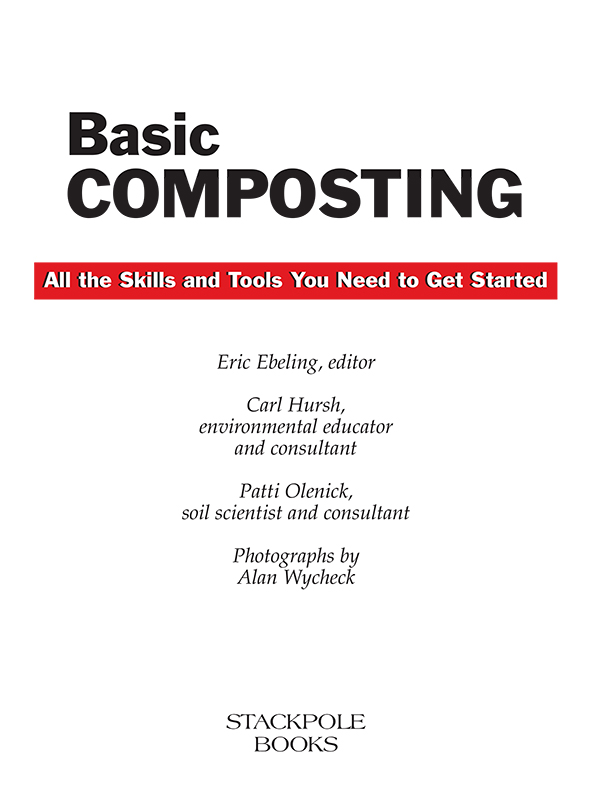
Copyright 2003 by Stackpole Books
Published by
STACKPOLE BOOKS
5067 Ritter Road
Mechanicsburg, PA 17055
www.stackpolebooks.com
All rights reserved, including the right to reproduce this book or portions thereof in any form or by any means, electronic or mechanical, including photocopying, recording, or by any information storage and retrieval system, without permission in writing from the publisher. All inquiries should be addressed to Stackpole Books, 5067 Ritter Road, Mechanicsburg, Pennsylvania 17055.
Printed in China
10 9 8 7 6 5 4 3 2
First edition
Photographs by Alan Wycheck
Cover design by Tracy Patterson
Library of Congress Cataloging-in-Publication Data
Basic composting / Eric Ebeling, editor. 1st ed.
p. cm.
Includes bibliographical references (p. ).
ISBN 0-8117-2647-9
1. Compost. 2. Organic fertilizers. I. Ebeling, Eric.
S661 .B38 2003
631.875dc21
2002015994
ISBN 978-0-8117-2647-4
eBook ISBN 978-0-8117-4681-6
Acknowledgments
T his book was a collaborative effort by so many talented people, and I hope I have managed to remember everyone who helped. My apologies to anyone I omitted.
My gratitude to: Alan Wycheck of Wycheck Photography in Harrisburg, Pennsylvania, whose skill behind the lens once again captured my vision for a book; Carl Hursh, whose composting skills are eclipsed perhaps only by his talents with homemade salsa; Patti Olenick, for shining her light through some dense material; Jina Padilla of Pennsylvania State Parks, whose keys unlocked a few important doors; Daniel Dindal, for the use of his classic illustration inside the common compost pile; Amy Wagner, for her sharp eye and even sharper wit; Tracy Patterson and Caroline Stover, for making this book look so good; Alison Abolins and Andy Goodwin, who donated their backyard as a shooting locale; Ed Abolins, problem-solver extraordinaire, for going that extra mile; Tim Maro, assistant manager and director of public works for the borough of Camp Hill, Pennsylvania, for making the time; and last, but far from least, my wife Andrea and son Alec, who somehow manage to teach me something new every dayeven after all these years.
Introduction
Y ou dont need a science degree or a shed full of sophisticated equipment to make quality compost. All you need is some know-how, a pile of organic materials, and a little bit of elbow grease. Nature does the rest.
The dark, rich soil covering the forest oor is a great example of this natural process in action. Fallen leaves blanket the dead limbs, plants, and other vegetation already on the ground. Over time, this mixture of materials breaks down into smaller and smaller pieces as millions of tiny organisms eat it, digest it, and convert it to waste. Think of these hungry decomposers as natures cleanup crew.
Eventually this layer of decaying leaves and plants becomes a carpet of lush humus loaded with nutrients. New plants, shrubs, and trees take root and ourish in this rich material, and the natural cycle continues.
The process is much the same when you compost in your backyard.
The word compost comes from the Latin for to put together, and that is quite literally what you have to doput together the correct amounts of unwanted yard waste, food scraps, and other organic items; manipulate environmental factors to accelerate natural decomposition; and make compost for use in ower beds, gardens, lawns, or anywhere you would use fertilizer or mulch.
The basic composting processes detailed in this book require no highly advanced skills to complete successfully. Keep in mind that this book was not conceived to be a dense technical manual on the science behind composting. Rather, this book contains all of the essential information you need to know, presented clearly for ease of understanding.
Under proper conditions, yard waste, food scraps, and other refuse can be converted into nutrient-rich compost for use in gardens and ower beds.
ACT NATURALLY
C hances are, because you hold this book in your hand, you already have made the decision that composting is right for you. Just in case you have any doubts about the benets of compostingfrom both a personal and a larger ecological standpointconsider these facts:
Compost is less expensive than conventional fertilizer and mulch. Other than a few basic startup costs, the investment needed is a little time and a minimum of labor. Compare that with the price of a pound of fertilizer, and the savings are obvious.
Fresh compost has been called a gardeners best friend. Compost improves the texture of any kind of soilsilty, sandy, hard, looseand allows it to hold more water or to drain more efciently. It basically replenishes the living part of the soil to make it a healthy, productive environment so plant roots can grow and thrive.
The projects contained herebuilding your own composting bin and screener, for instancerequire only common tools and a basic understanding of how to use them. You do not need to be a carpenter or a skilled handyman for these do-it-yourself suggestions.
Compost acts as a slow-release fertilizer, providing a wide range of nutrients, enzymes, and vitamins over time that plants need to stay healthy and ourish. Microorganisms in the compost allow these nutrients to be absorbed more readily into the plants. Most nished compost contains a pH level that is almost neutralmeaning it is neither too acidic nor too alkaline. A majority of plants respond well to soil with a neutral pH, and this can give your plants, shrubs, and lawn a more lush appearance. Whats more, the natural properties of compost eliminate the need for harsh and expensive lawn chemicals that can adversely affect the environment.

